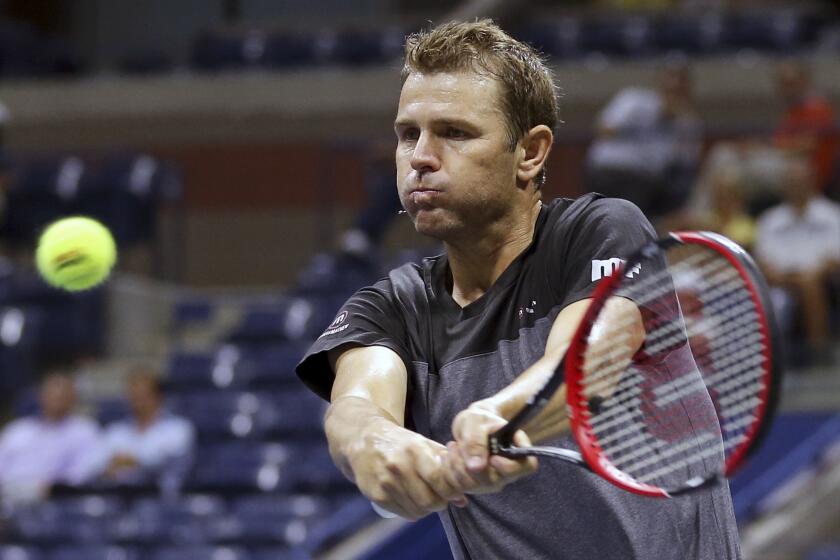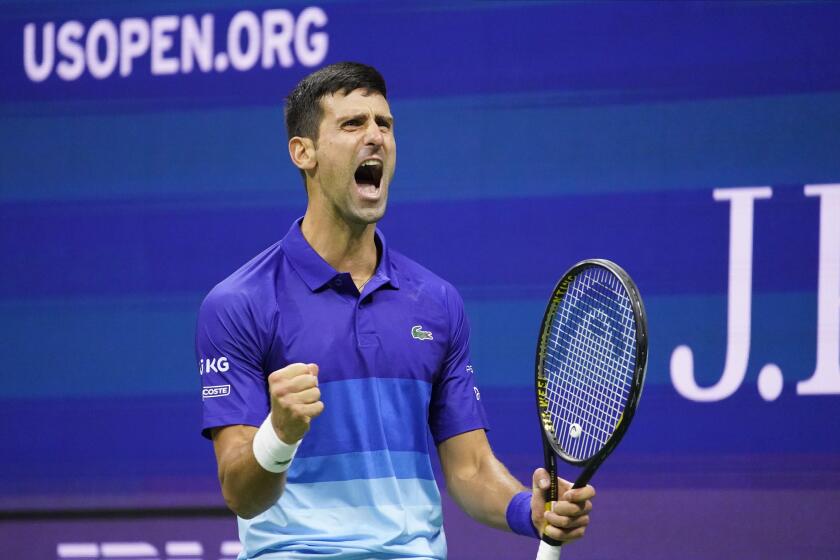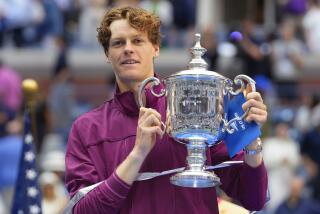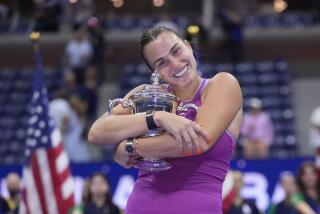U.S. Open notes: How Murphy Jensen stays sober and alive
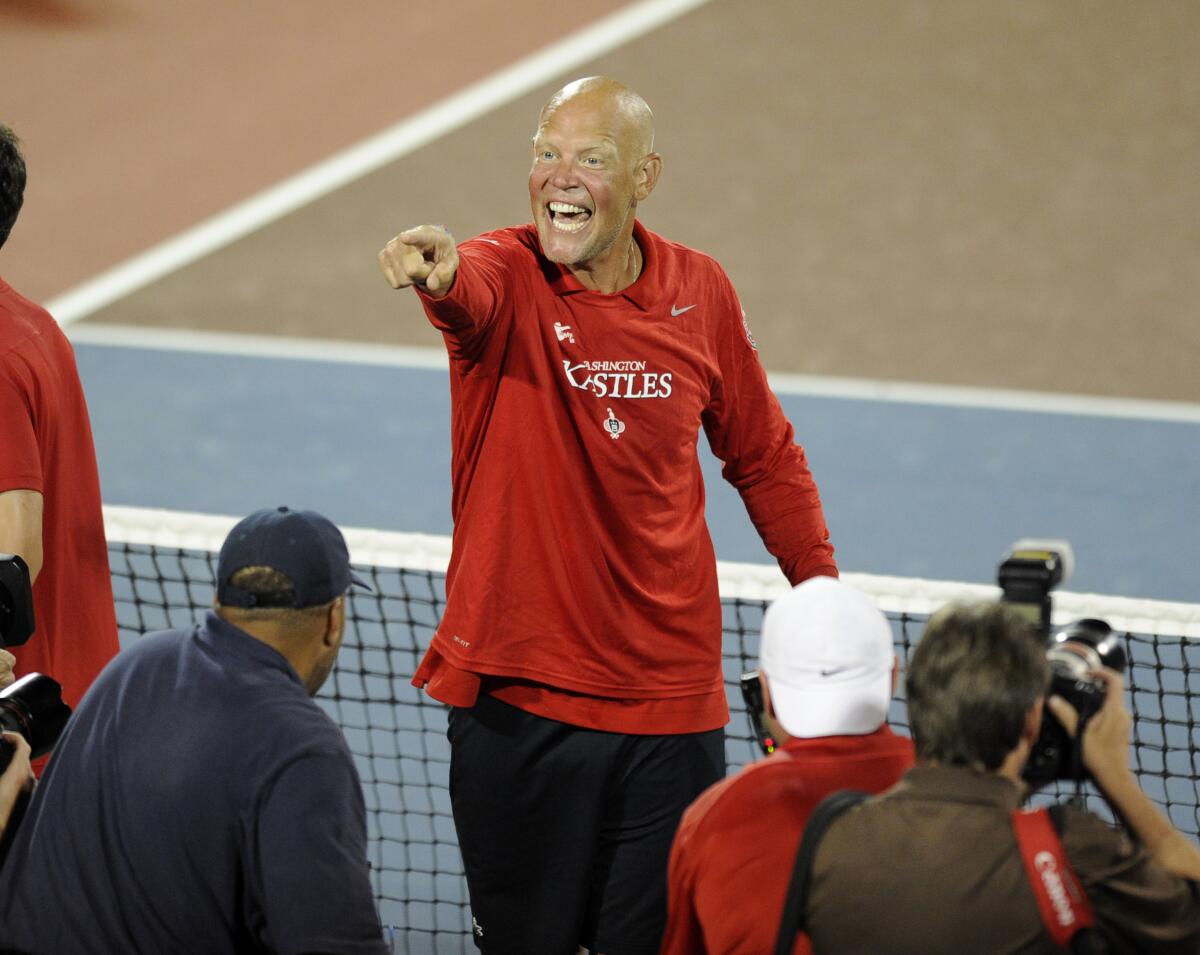
The U.S. Open holds many memories for Murphy Jensen, who has attended the tournament every year since he was 15 and watched his older brother Luke play in the junior competition.
Jensen, who spent two years at USC, built his own career, highlighted by teaming with Luke to win the 1993 French Open doubles title. With success came pressure and, eventually, excess.
“On the outside I was the best in the world. On the inside, I didn’t feel like I measured up or I was enough,” he said. “I had this fear of being found out. I was keeping a secret. … I was a periodic user that ended up drinking and using for relief. Almost pain relief. Pain I didn’t even know I had.”
By the time his son Billy was born in Los Angeles 22 years ago this week, Jensen’s life had spiraled out of control. He was abusing drugs and alcohol, supplemented by pills taken to help him sleep.
“I was at a jumping-off place where jumping out a window seemed like a good idea,” he said. “Somehow I was able to get to Los Angeles and instead of a hotel manager calling the police, he called an interventionist and that interventionist — I still hadn’t seen my baby yet — asked if I’d be willing to get help. And I may have had a day to live. Maybe. And I was dying and I didn’t know how to stop dying. And I was OK to die.”
Jensen went through a detox program in Culver City, followed by residence in a sober living home. He got a pass to play in the 2000 Australian Open; while there his father took him to support group meetings in Melbourne and Sydney.
Mardy Fish was at the peak of his tennis career when crippling stress forced him to withdraw so he could focus on his mental health. He shares his story in a Netflix documentary and offers advice to tennis players
As of Thursday, Jensen had been sober 5,580 days. His mission now is to help guide others out of the darkness that nearly consumed him and to help them manage and maintain their recovery.
Jensen, 52, is a co-founder of WEconnect Health Management, which offers a mobile app to support those who are in recovery. Those who use the app can find virtual support groups, meetings, rewards for meeting specific challenges and assistance in performing everyday functions for as long as they need it. There’s a free app and also a premium level with additional services.
The company, founded seven years ago, “was built by people in recovery for people in recovery,” he said, and it addresses a wide range of issues to help people stay with their care plan.
“Where do you live? Where do you get food? Do you have clothes to wear? When I got out of detox, even with money, I didn’t know what I was going to do,” Jensen said. “My brother, my family, had to turn off my credit cards because I couldn’t trust myself in that place. And at that place and time in my life I needed to let go of my way and have the willingness to let people help me.”
Jensen said he has not been tempted to drink or use drugs again. “That’s been the gift,” he said. “The gift is the obsession to drink or the obsession of the mind and the triggers and drinking and using is not an option for coping with anxiety, fear. Not today. I don’t look at it as, ‘I’m going to stay sober for the rest of my life.’ I’m doing Thursday with you and that’s more than enough because I don’t know about tomorrow. I’m already living on house money from where I was.
“Everything I know, everything beautiful and pure and of value in my life has the stamp of recovery all over it. And the love that I get from my family and I’m able to give my family and the father that I am and the husband and the son and the brother and the friend is a direct result of the gift of recovery.”
Novak Djokovic outlasted Alexander Zverev in five sets to reach the U.S. Open final, where he’ll face Daniil Medvedev and try to achieve the calendar Grand Slam.
Mixing it up
Desirae Krawczyk of Palm Desert joined some elite company on Saturday when she teamed with Joe Salisbury of Britain to defeat former USC star Giuliana Olmos and Marcelo Arevalo of El Salvador 7-5, 6-2 to win the U.S. Open mixed doubles championship.
Krawczyk, who won the French Open mixed doubles title with Salisbury this year and then switched partners to win the Wimbledon mixed doubles title with Briton Neal Skupski, became a member of the small club whose members have won three mixed doubles titles in one year since the Open era began in 1968.
Margaret Court won all four Slam mixed doubles titles with Ken Fletcher in 1963 and won three of four twice, with Fletcher in 1964 andwith Marty Riessen in 1969. Martina Navratilova won three Slam mixed doubles titles in 1985, two with Heinz Gunthardt and one with Paul McNamee. Most recently, Martina Hingis partnered with Leander Paes to win the Australian, Wimbledon and U.S. Open mixed doubles titles in 2015.
“Honestly, just to think about that, it’s just crazy to me,” Krawczyk said in a post-match interview. “I’m just happy with how well I’ve done. It hasn’t really sunk in yet. I’m just happy to be able to play in front of a lot of friends and family here and to play with Joe and have our whole team with us. It’s been a good two weeks.”
Salisbury had an excellent tournament, too. On Friday he teamed with American Rajeev Ram to win the men’s doubles championship as they rallied past Jamie Murray of Great Britain and Bruno Soares of Brazil, 3-6, 6-2, 6-2.
Krawczyk and Salisbury both played college tennis, Krawczyk at Arizona State and Salisbury at the University of Memphis.
“I think college tennis for me was a big steppingstone for going into the pros,” Krawczyk said. “It definitely helped me grow as a player, and as a person I think it played a major key into how I developed throughout these years.”
She and Salisbury will split $160,000. The runners-up will split $78,000.
More to Read
Go beyond the scoreboard
Get the latest on L.A.'s teams in the daily Sports Report newsletter.
You may occasionally receive promotional content from the Los Angeles Times.

